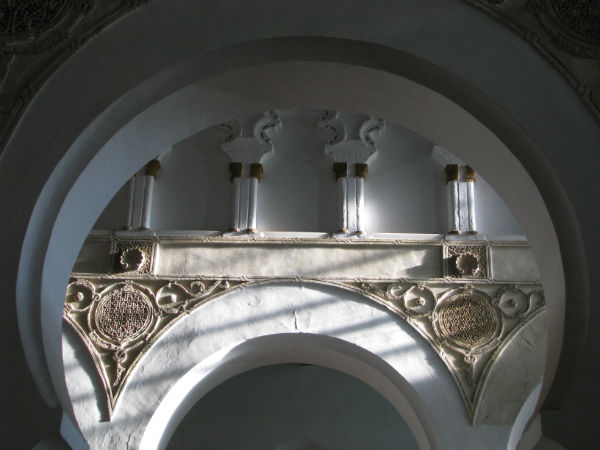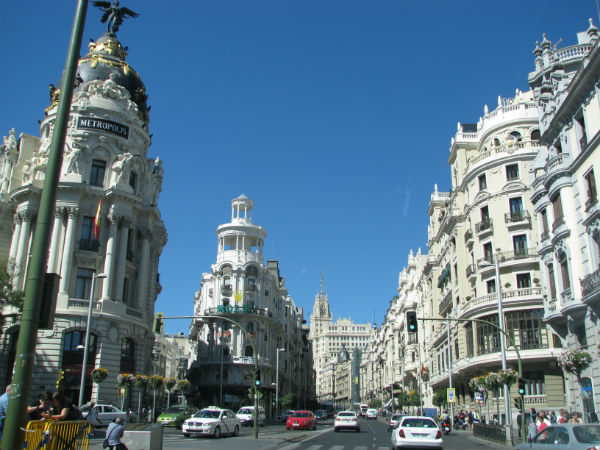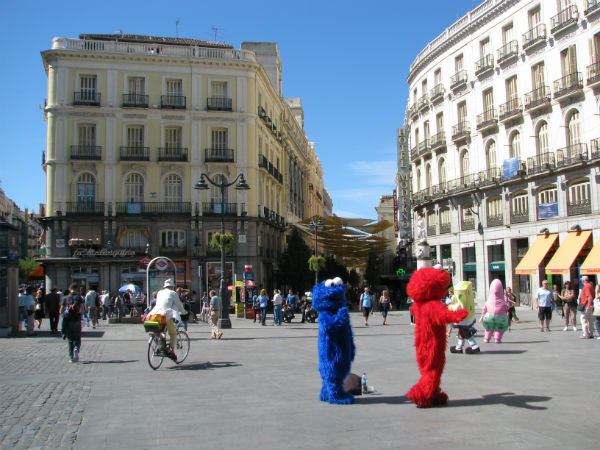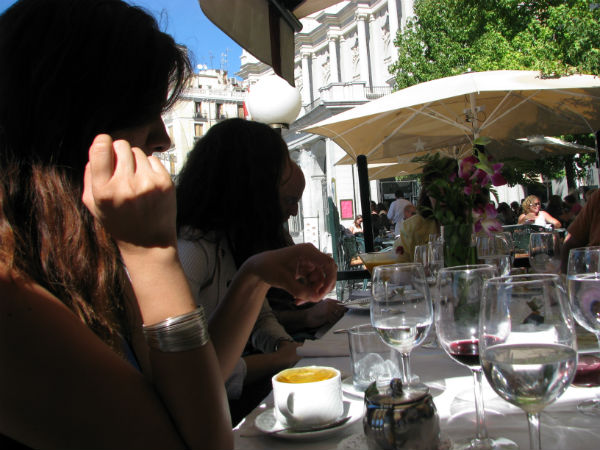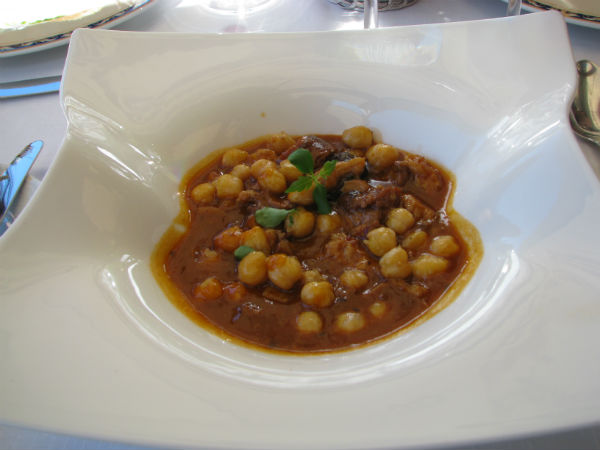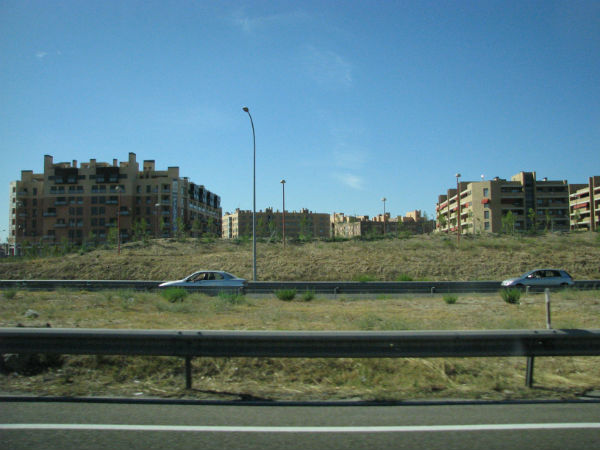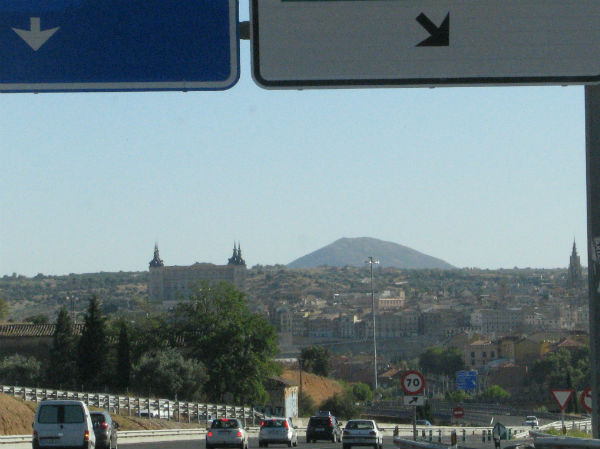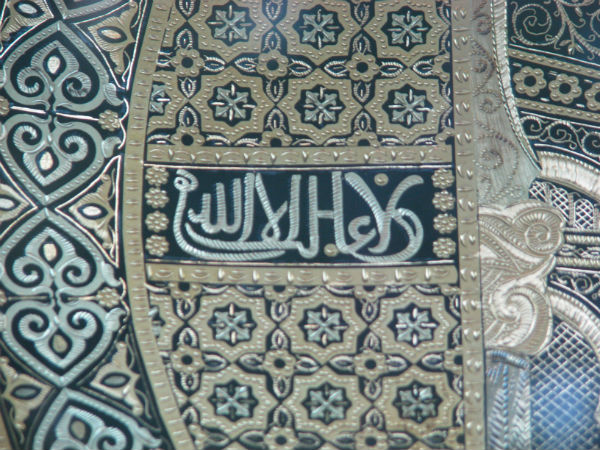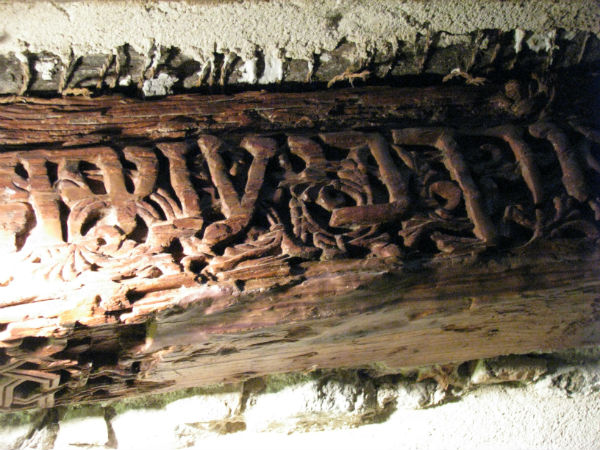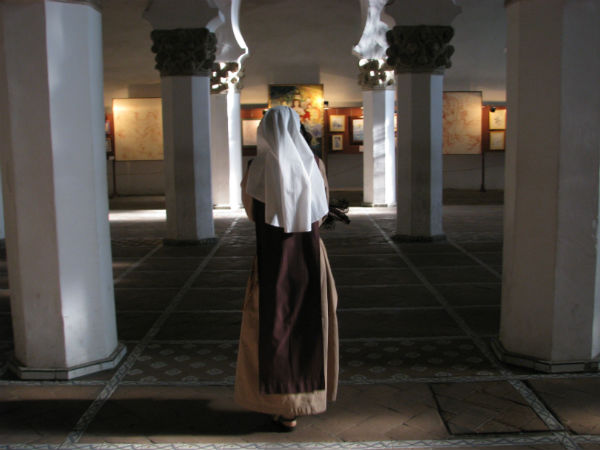Staying on the road in Israel and the Palestinian territories (and beyond) through a month of trial. And today: Mi casa, su casa
I came to Spain to look for my country, and am beginning the trip by looking for my suitcase, lost at the airport. The lost luggage personnel frown at the mention of El Al. They are expressing simple criticism of the company’s handling of luggage, but the deeply ingrained Israeli instinct retorts: antisemites!
No, no, no. This is an opportunity to break out of these paradigms if there ever was one. Lea Netzer’s Sepharadic-history initiative has a real political edge over the Poland trips organized for Israel’s teenagers: its reluctance to fuel our victim tendencies. History did make Jews into victims again and again, but dwelling on this as often as we are encouraged to do leads to stigmatizing innocent airport employees.
I’d rather head into the world full of love, and Madrid helps. It’s a gorgeous day over the Paseo della Castellana, 20 degrees celsius under blue skies offer precious respite from The Holy Land’s relentless scorch. The day keeps growing beautiful as we turn onto Gran Via and come face to face with, well, Europe.
My hotel room overlooks the density of the Malasaña quarter. I walk out to the balcony, deeply enamoured.
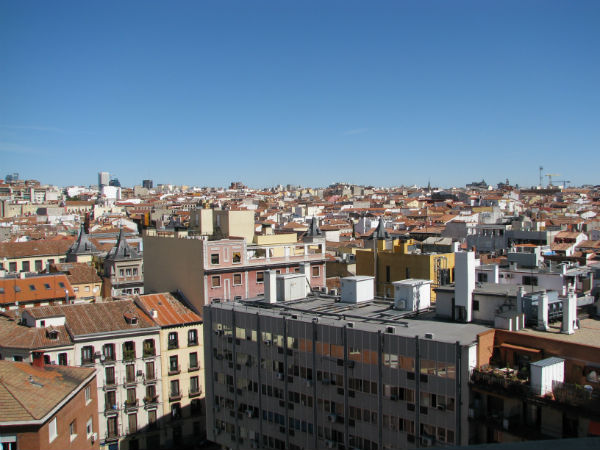
In the middle ages, Europeans used the call “Hep! Hep!” to torment Jews. This was a word used by shepherds to gather their livestock, and its use meant to make Jews feel less than human. Medieval apologists, however, seemed to think that the mockery wouldn’t be complete without an intellectual interpretation. “Hep”, they claimed, stood for the Latin “Hierosolyma est perdita”: Jerusalem is lost to you.
Europe is lost to us. We come here and are taken away by it. It priced us out and then kicked us out of the tents we pitched. Our miserable, packed ghettos weren’t punishment enough. We had to go further, either up in smoke or to burning Palestine, to take our hurt out on others.
Enough bitterness, Europe is trying to make friends now, and does so in a wise and moving way. We head out to meet Ursula and Sonia, both of whom work at the Sepharad Israel house, a governmental organization dedicated not only to bettering Spain’s relations with Israel, but with worldwide Jewry.
On the way over we pass through Puerta del Sol, the site of last spring’s mass demos and of Madrid’s tent city. In the previous post I brought Lea’s impression from those times and mentioned that the Spanish struggle served as inspiration to our own. The hand gestures used in conversation circles were copied from Puerta Del Sol, the spirit of direct democracy was emulated, and more. Unlike the Spaniards, our struggle failed to make a distinct demand, which contributed to it’s gradual fading.
In Spain, early elections were called, and the square returned to be the abode of Muppets and Sponge-Bobs.
Walking through it, I can’t decide whether to be jealous of the Spanish or glad for our seeming failure. An achievement that may or may not be a real achievement was reached here. We are still hungry. It may be more difficult to reignite the Spanish street following the elections, even if the local financial crisis deepens. Ours is still flammable.
In any case, the sight of the Madrileno street can be misleading. This country doesn’t look bankrupt. It simply is. I walk through thinking that I wouldn’t mind being bankrupt like that, with a nice plate of jamon in front of me, in good weather, thousands of kilometers away from the nearest concrete separation wall. Hierosolyma est perdita.
Besides Lea and myself, four other Israeli journalists joined the tour. All of us occupy a happy table outside the Cafe del Oriente, one of Madrid’s finest, twixt royal palace and royal opera. My fears of an entirely kosher tour are dispersed as the gazpacho arrives graced with foam of langustine.
Ursula, the organization’s director of communications is first to bring up September. “What do you think will happen this week?” she asks, ” are you all worried?”
Fortunately for her, one of Israel’s most important publicists is seated directly across from her. It is Ben-Dror Yemini, who writes for Maariv, and he has a story: “Once this American scientist made an experiment. He posed a question about the future to a group of political experts, a group of journalists and a group of monkeys, then evaluated how well their prediction skills in light of what actually ended up happening. The monkey fared best, second came the journalists.”
I say that what troubles me is that my government seems least ready to accept change at a point in time when change is imminent. Even experts would agree with that, not to mention the monkeys.
To Sonia, the director of education at Sepharad Israel, there is something more troubling than resistance towards change, and that is change for the worse: “I feel that Israel’s growing isolation, as in the Turkish affair, is scarier than the whole UN thing,” she says.
Wherever you go, there you are. Traveling to Spain is hardly the cure for an Israeli’s worries, at least as long as such concerned souls are to be found. I focus on the stew of tripe, blood sausage and chick peas I ordered with some courage, and which proves fantastic.
Following some coffee and truffles and a financier, the mood is considerably brighter, and we’re ready to head down the 70 kilometers leading to the city of Toledo. On the outskirts of Madrid a member of our group, fine journalist, editor and reader of this journey Maoz Degani, remarks that even Madrid’s suburban apartment blocks hold a certain quality that makes them less horrid than their Canaanite counterparts. The rest of the group disagrees and eventually Maoz surrenders. The faraway hills are green.
Toledo, Jerusalem on the Tajo river, receives us with a prosaic variation on El Greco’s famous rendering of its skyline.
As we enter we pass a sculpture on which words are inscribed in Hebrew. These are lines of Hebrew poet Yehuda Halevi, written during the Golden age. The poem is a parphrase on Psalm 48:2. It describes the beauty of Jerusalem and the poet’s symbolic longings for it. I personally long for Toledo, a city famed for its Marzipan.
Manuela, our wonderful guide, takes us through this attractive city on a hill. We pass by the arresting cathedral. She explains that previously here stood a mosque, but that before the mosque here stood a Visigoth church, and that before the church here stood a Roman temple. Nothing is more evocative of Jerusalem then such a list. I think back to the Israeli idea of Jerusalem as Israel’s “Eternal capital”. Whoever came up with that? Don’t they know what they say? Man does and Jerusalem laughs.
Jerusalem on the Tajo is lost, and not only to us. The Muslim Moors were expelled from Spain one month before the Jews. All that’s left are Arabic letters on decorative plates.
Hebrew letters on 9th century doorways
And international symbols marked and then crossed out on walls.
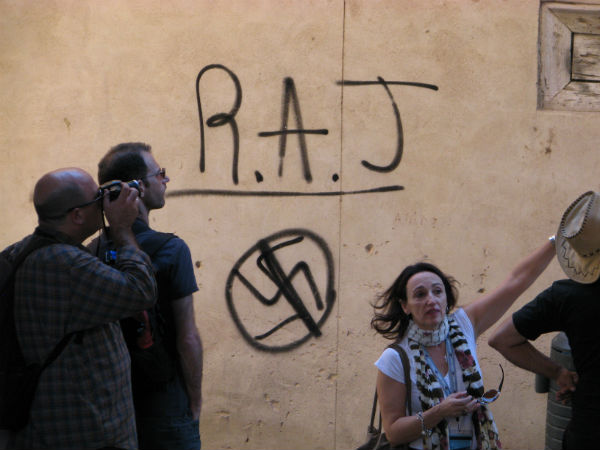
Inside what used to be the Ben-Shushan synagogue, and later turned into a church, sister Olga is pacing. On her cross, a tiny star of David is etched. She’s just as good intentioned as Ursula and Sonia. Still, something bad did happen here and there’s no hiding that.
Homes are lost, we must bear that in mind. Homes must be protected, protected wisely. I’m thinking of Sonia’s prime worry. She, who has no Jewish roots, who lives comfortably in one of the world’s capital cities, worries for my home. I worry along with her, and as I look town into the Tajo’s imposing ravine, a little poem by Brecht suddenly leaps to mind:
Here stood the ancient Moors
And looked towards the sea.
And they said: not many days are left
Soon we will no longer be,
And in this the Moors were certainly right
For there’s little of them left to see.
Where they had once stood, Brecht now stands
And looks towards the sea.
Click here for more of the september journey
Thanks for reading and taking part in the adventure. If any of you would like to pitch in for my travel and food, please do so using the “donate” button at the top of this page. Please be sure and specify that you are contributing to Yuval’s September Journey. I’m deeply grateful to those who already donated. Thank you so much! This trip would have been impossible if not for you.


